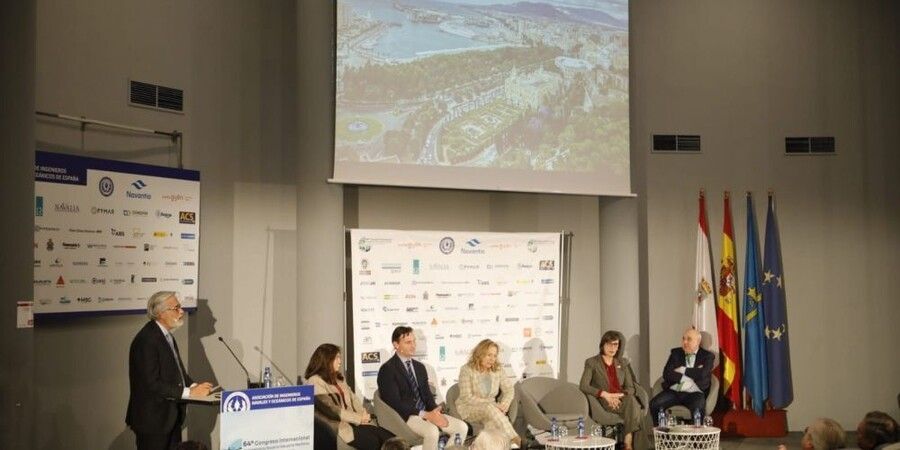The naval sector seeks to attract talent to ensure generational renewal

Diego Fernández, president of the Association of Naval and Oceanic Engineers of Spain (AINE), highlights the presence of talented individuals in the naval industry. However, he also stresses the need to foster collaboration between universities and companies to ensure a dynamic transfer of knowledge.
The 64th International Congress of Naval Architecture and Maritime Industry, held in Gijón, provided a platform for discussions on decarbonisation, investment in renewable energies, fleet modernisation, and the potential of industrial training in defence; let alone an urgent call to attract new professional talent to the sector.
Diego Fernández, president of AINE, emphasised the existing talent in the naval industry while urging stronger collaboration between businesses and universities to transfer knowledge onto one another. Meanwhile, Nieves Roqueñi, president of the Port Authority of Gijón, reaffirmed the port’s commitment to sustainability, detailing investments in green energy and digitalisation.
On his case, Laudelino Alperi, president of Astilleros Armón, highlighted the need to enhance efficiency in European naval construction and safeguarding stakeholders across the value chain. Overall, this forum served as a crucial meeting point for shaping the future of the industry, addressing sustainability, digitalisation, fishing fleets, and offshore renewable energy.
Regarding decarbonisation, Javier Martín Arroyo, from Astilleros Gondán, announced that by 2025, all of the company’s vessels will be powered by electric or hybrid systems. Meanwhile, Luis Santos, from Freire Shipyard, warned about the rapid obsolescence of technology, while Ignacio Gómez, from SYM Naval, pointed out that normative commitments will drive change. Pablo García, from Baleària, insisted on the need for financial support to facilitate this transition.
Regarding offshore wind energy, Antonio Preckler, from Pymar, informed about the importance of industrial collaboration to improve competitiveness and production capacity, and Covadonga Carballo, from Windar Renovables, remarked the role of CBAM and the investment on AI and VR. Meanwhile, Martín Fernández, from the port of A Coruña, defended floating wind power as a great chance in industry.
Fishing and defence industries
In the fishing industry, fleet renewal and the energy transition were key topics. Javier Garat, from Cepesca, stressed the urgent need to modernise Spain’s fishing fleet. Likewise, José Ramón Antón, from Faustino Carceller, and Aitor Uriarte, from Cintranaval, pointed out the strict regulations that hinder the development of more efficient vessels. José Ramón Regueira, from Nodosa Shipyard, warned about excessive regulatory rigidity, while Mario Cardama, from Cardama Shipyard, underlined the importance of strengthening cooperation between shipyards and vessel owners.
As for the fishing industry, the renewal of the fishing fleet and the energetic transition have been matters of priority. Javier Garat, from Cepesca, pointed out an urgency to upgrade the fleet of the Spanish Army, and José Ramón Antón, from Faustino Carceller, and Aitor Uriarte, from Cintranaval, referred to strict regulations for building vessels as restrictive. José Ramón Regueira, from Nodosa Shipyard, warned about strict regulations, while Mario Cardama, from Cardama, highlighted the importance of strengthening collaboratin between shipyards and shipowners.
The final panel focused on the need for greater collaboration between the Spanish Navy and the industry to enhance naval capabilities. With a focus on digitalisation, artificial intelligence, and resource optimisation, the Armada 2050 plan is expected to play a pivotal role in shaping the future of Spain’s maritime defence.
Ana Buendía, from Indra, highlighted the importance of data interconnectivity and rapid adaptation to new technologies, while Eduardo Dobarro, from Navantia, spoke about the impact of digitalisation on naval vessels. Francisco José Cuerva, from Ghenova, stressed the need to strengthen the link between the Spanish Navy and industry to bolster industrial capabilities. Additionally, Manuel Vila, from the Spanish Defence Industry Cluster, advocated for a long-term Defence Budget Law to ensure sustainable funding.
Meanwhile, Juan Manuel Paíno, from Astilleros Armón, underscored the role of the naval industry in the development of innovative technologies. The congress concluded with the announcement that Málaga will host the 65th edition.
Source: Cadena de Sumunistro

